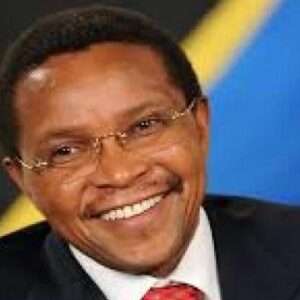Jakaya Mrisho Kikwete, who replaced Benjamin Mkapa as President of the United Republic of Tanzania, is the current President. He was elected on the CCM ticket, which is a prominent party in that country. The dynamic East African leader is credited with many improvements and advancements in the country. The President is praised for being outgoing, approachable, and media friendly. He comes from a family of leaders, which is presumably why he rose up the ranks to become Tanzania’s most powerful man. Mrisho Kikwete, his grandpa, was a local chief. His father served as a District Commissioner during colonial times, then as a Regional Secretary, and finally as an Ombudsman when Tanzania gained independence. There’s little doubt that these two incredibly influential people in his life taught him a lot about leadership. He was easily elected into leadership posts throughout his school career, which led to his easy election into the CCM and TANU youth wings following graduation. He is now in his second term in power, having won a landslide victory in the most recent general elections. The professional economist has also been voted as the leader of regional groups such as the African Union and the Southern African Development Community.
Early life and childhood
Kikwete was born in Msoga, Bagamoyo, Tanzania, previously Tanganyika, on October 7, 1950. Tanzania is located on the Indian Ocean’s East African coast.
He began his studies at Tanzania’s ‘Karatu Primary School’ in 1959 and later went to ‘Tengeru School’ for his middle school education. For his O-levels, he enrolled at ‘Kibaha Secondary School.’
For his advanced level study, he stayed at ‘Kibaha Secondary School.’ Later, he enrolled in the ‘University of Dar es Salaam,’ where he earned a bachelor’s degree in economics.
Career of Jakaya Kikwete
Throughout his political career, this charismatic leader has moved from one post to another in various party ranks and from one working station to another. For example, when Zanzibar’s ‘Afro-Shirazi Party’ (ASP) and TANU joined in 1977 to form ‘Chama Cha Mapinduzi’ (CCM), he was transported to the island and charged with establishing a new party administration and structure.
He became Tanzania’s finance minister in 1994. Later, he was promoted to the position of ‘Minister of Foreign Affairs and International Cooperation.’ He held this job for ten years before being elected President of the United Republic of Tanzania. He is Tanzania’s longest-serving foreign minister to this day.
He has been a key figure in the mission to reconstruct East Africa’s regional integration, known as the ‘East African Community.’ Tanzania, South Sudan, Kenya, Rwanda, Burundi, and Uganda are attempting to form a political and economic union.
He also played a key role in the establishment of the ‘Helsinki Process on Globalization and Democracy.’
He won the party’s nomination to run for President in the general elections on 4 May 2005, beating out 11 other CCM contenders. He was sworn in as the Fourth President of the United Republic of Tanzania after the Electoral Commission declared him the winner of the general elections in the same year.
He said in an ‘African Union’ meeting on May 26, 2013, that President Yoweri Museveni of Uganda and his Rwandese counterpart, President Paul Kagame, could negotiate a ceasefire with the ‘Allied Democratic Forces-National Army for the Liberation of Uganda’ and the ‘Democratic Forces for the Liberation of Rwanda’ because President Joseph Kabila of the DRC negotiated with the ‘March 23 Movement.’ In his reaction, President Museveni expressed his openness to negotiate.
Major Projects of Jakaya Kikwete
Tanzania’s Vision 2025 is being implemented by the President. This is the plan to transform the country from a low-income to a middle-income one. There is also a ‘Big Results Now’ model for accelerating the country’s economic development.
This concept was adapted from Malaysia and has shown to be successful in Nigeria, as well as Rwanda, where it is now being implemented. When it was first unveiled, the President stated that the country would focus on the exploitation of the following areas in order to succeed: resource mobilization, energy and natural gas, water, education, transportation, and agriculture.
Achievements & Awards
In Uganda, he was awarded the ‘Most Excellent Order of the Pearl of Africa’ in 2007.
In 2009, he was awarded the ‘Order of the Green Crescent of Comoros’ on the island of Comoros.
In 2009, he was awarded the Order of Abd al-Aziz by the Saudi Arabian government.
Personal History and Legacy
Although this was his second marriage, Jakaya the family man wedded her long-time fiancée Salma Kikwete in 1989. They were eventually blessed with eight children, one of whom they adopted. Ridhiwani, Salama, Khalifa, Miraj, Ally, Khalfan, Rashid, MwanaAsha, and Mohamed, the adoptive child, are the children.
The beautiful and always cheery President has been praised for his willingness to work with other East African Community leaders. When needed, he has always offered his counsel and aid. For example, he aided in the resolution of the Kenyan issue that arose following the contentious 2007 general elections.
Former UN Secretary-General Koffi Annan and other leaders, along with his predecessor, H.E. Benjamin Mkapa, arbitrated between Kenyan President Mwai Kibaki and Raila Odinga, persuading them to create a grand coalition government.
Jakaya Kikwete Net Worth
Jakaya Kikwete is one of the wealthiest world leaders and one of the most beloved. Jakaya Kikwete’s net worth is estimated to be $1.5 million, according to Wikipedia, Forbes, and Business Insider.


